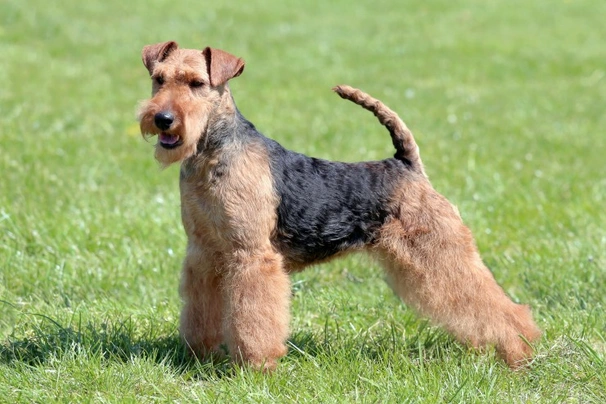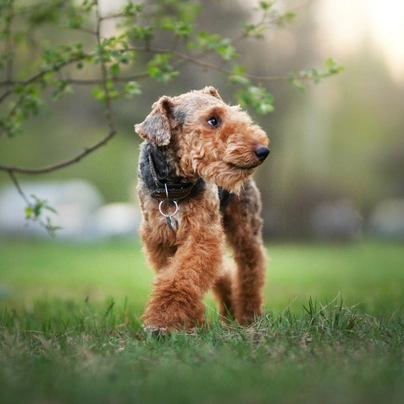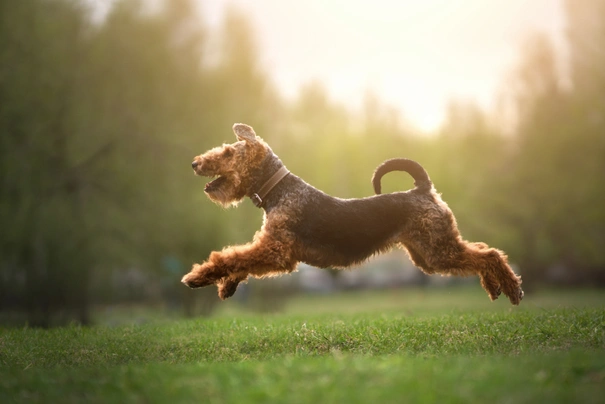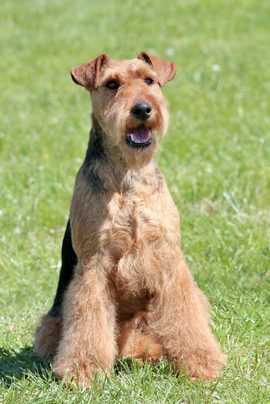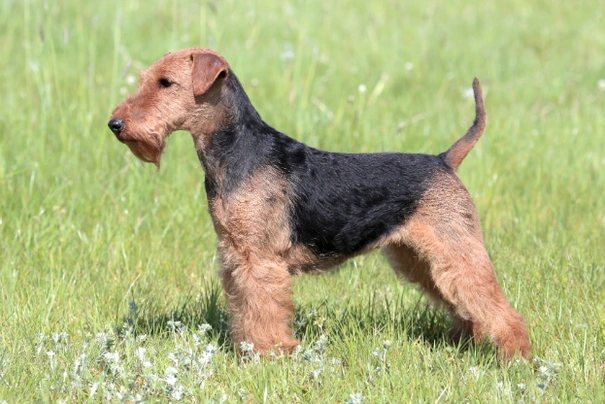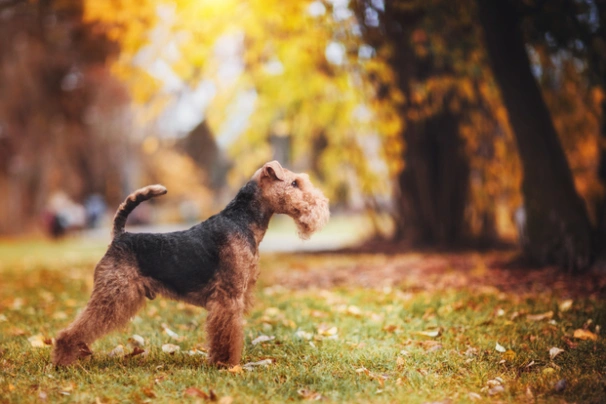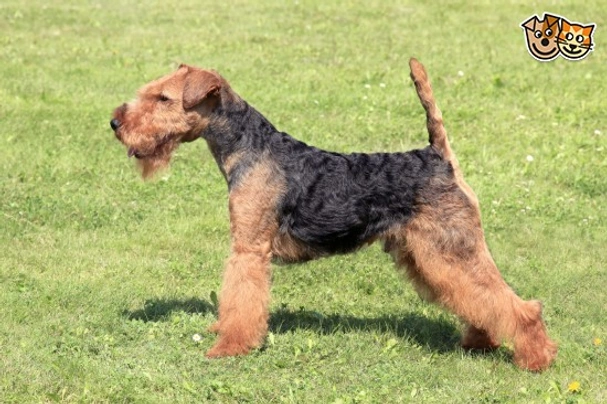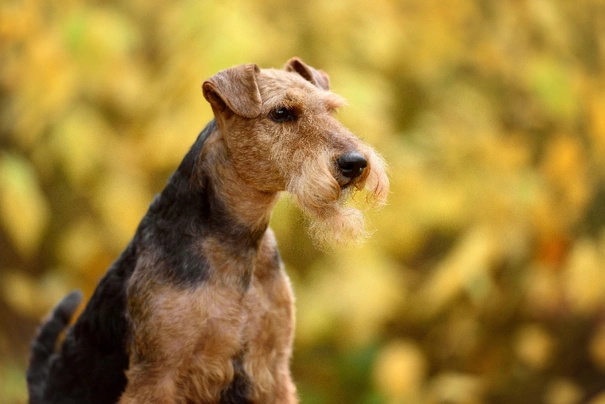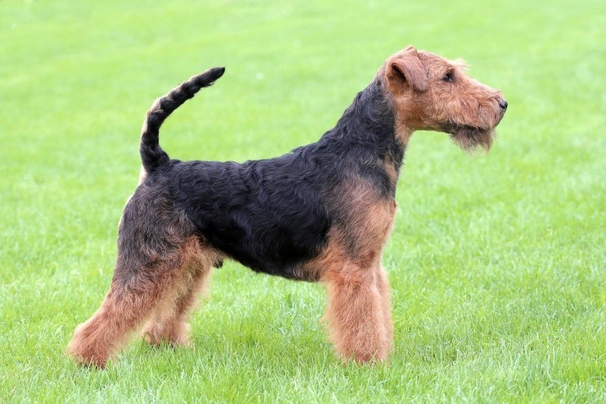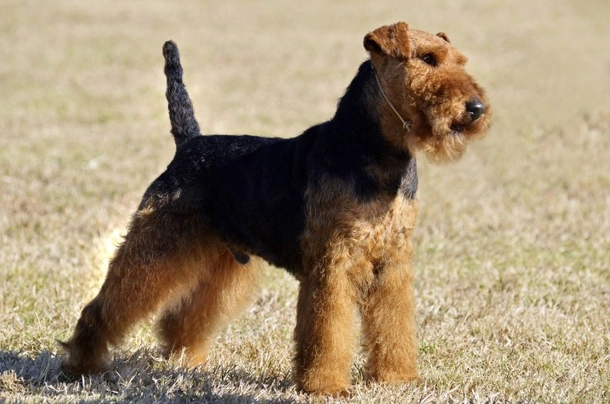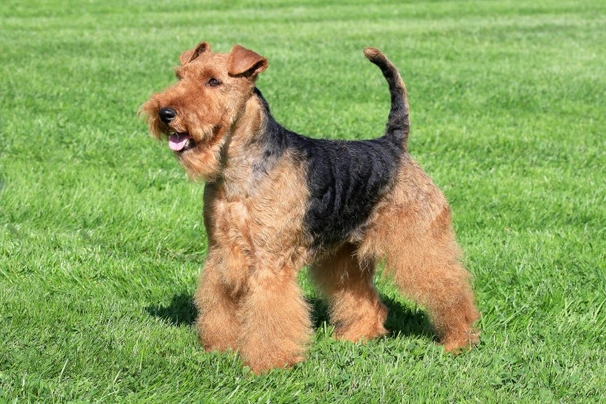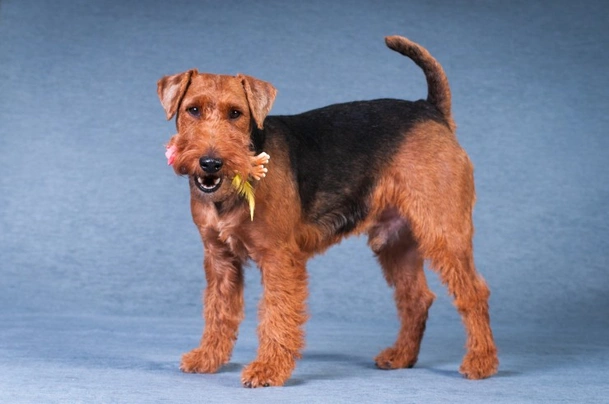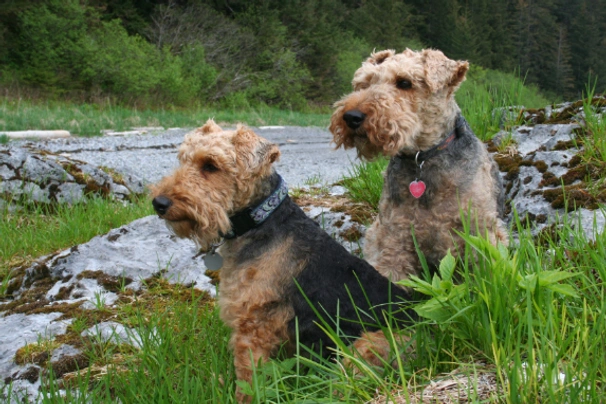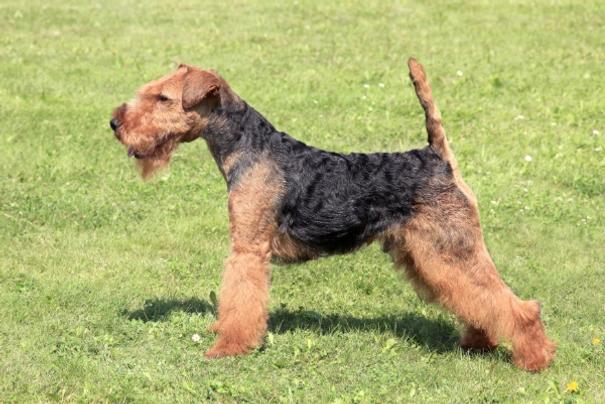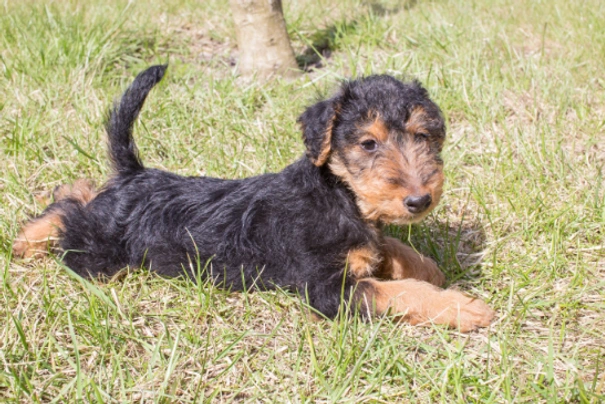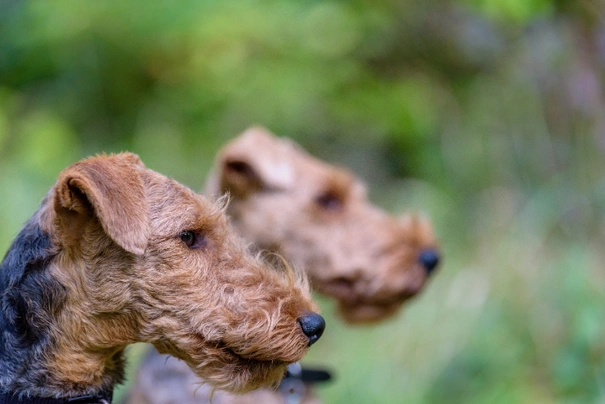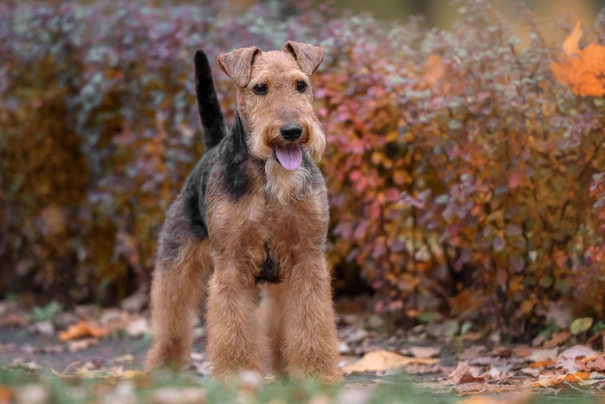Welsh Terrier
Pros
Cons
Introduction of the Welsh Terrier
The Welsh Terrier is one the UK's lesser known breeds and even today is a vulnerable native breed with only around 380 dogs having been registered with The Kennel Club in 2015. They are happy fun-loving intelligent characters with much calmer dispositions than many other terrier breeds. They are known to be particularly good around children and true to their working ancestry which in short means they have a high prey drive.
Welshies are compact little dogs that boast a thick wiry coat and lots of hair around their faces which adds to their charming appeal and although they shed very little hair they are high maintenance on the grooming front. Because Welsh Terriers are a vulnerable breed anyone wishing to share a home with one would need to register their interest with breeders and go on a waiting list for the pleasure of doing so.
History of the Welsh Terrier
It's thought that the Welsh Terrier boasts having a common ancestry with the Lakeland Terrier and looking at the two breeds it's easy to understand why considering the two breeds similarity. It is also thought that Welsh Terriers are the purest and oldest of all native terrier breeds. There are those who believe that the Celts took their dogs with them when they sought refuge in the mountains and Lake District during the time of the Roman invasion. However the true origins of the Welshie remains a bit of a mystery although some experts believing the breed could be directly linked to the Old English Black and Tan but this continues to be hotly debated.
During the 1800's the people of Caernarvonshire thought highly of their terriers and the purity of the breed. It was during this time that they were called as the Caernarvonshire Welsh Terrier. These active terriers were first bred to hunt vermin which included rats foxes or badgers. They excelled at their job throughout the following centuries. But these workmanlike terriers were only recognised as a breed in their own right here in the UK in 1885 although in the States they were still categorised as being Old English Terriers right up until 1901.
It is worth noting that Welsh Terriers are known to be less "quarrelsome" than many other terrier breeds which combined with their fun-loving and clever natures made them popular not only as working terriers by as companions and family pets too. Today the Welsh Terrier remains on the UK's vulnerable native breed list with very few puppies being registered with The Kennel Club in 2015. As such anyone wishing to share a home with a Welshie would need to register their interest with breeders and agree to being put on a waiting list but the wait would be well worth it because these little terriers make wonderfully loyal family pets that are a pleasure to have around.
Interesting facts about the breed
- Is the Welsh Terrier a vulnerable breed? Yes they are one of the breeds that has been listed on the Kennel Club's native vulnerable breed list
- Anyone wanting to share a home with a Welsh Terrier would need to register their interest with breeders and go on a waiting list for the pleasure of doing so
- Welsh Terriers are known to be spirited and fun-loving
- Puppies are born with black coats which change as they get older
- They were originally bred to keep vermin under control but later they were popular on the hunting field
- Traditionally a Welshie's tail was always docked but since the law banning the procedure came into effect in 2007 tail docking is now illegal with the exception being for some working breeds and if a dog suffers from some sort of health issue that requires their tails to be docked. The procedure must be agreed and authorised before being performed by a qualified vet
Appearance of the Welsh Terrier
Height at the withers: Males 39 cm Females 39 cm
Average weight: Males 9.0 - 9.5 kg Females 9.0 - 9.5 kg
The Welsh Terrier is a compact sturdy well-balanced little dog and one that boasts a tremendous amount of appeal with their endearing looks and calm natures. Their heads are rather flat between the ears and they boast having extremely powerful clean cut jaws which are perfect for the job they were originally bred to do. They have a subtle stop and a nice black nose. Their eyes are quite small being dark in colour with Welshies always having an alert and kind expression in them.
Their ears are small and V-shaped being set quite high on a dog's head. They carry their ears forward and close to their cheeks. The Welshie has a strong jaw with a perfect scissor bite where their upper teeth neatly overlap their lower ones. Their necks are moderately long and quite thick being slightly arched before it slopes neatly into a dog's shoulders. Shoulders are long and well set back with dogs having muscular straight front legs showing a good amount of bone.
Their chests are quite wide and their backs are short with dogs having nicely developed ribs and strong loins. Their back legs are strong with muscular thighs and feet are very cat-like being small and round in shape. Tails are well set and dogs carry them upright gaily which adds to their overall balanced happy appearance.
When it comes to their coat the Welsh Terrier boasts having a hard wiry coat that lies very tight to their body and a softer denser undercoat. The accepted breed colours for Kennel Club registration are as follows:
- Black & Tan
Gait/movement
When a Welsh Terrier moves they do so with great purpose carrying both their front and back legs nicely forward and parallel to each other. Dogs keep their elbows perpendicular to the body with their stifles neither turning in nor out.
Faults
The Kennel Club frowns on any exaggerations or departures from the breed standard and would judge the faults on how much they affect a dog's overall health and wellbeing as well as their ability to perform.
Males should have both testicles fully descended into their scrotums and it is worth noting that a dog can be a little lighter or heavier as well as slightly taller or shorter than set out in the Kennel Club breed standard which is given as a guideline only.
Temperament of the Welsh Terrier
Welshies are known to be extremely affectionate characters and because they are so smart and willing to please they are easy to train. They form strong bonds with their owners and families becoming a valuable member of a household and one that thrives in being involved in everything that goes on around them.
They can be a little aloof and wary of strangers but rarely would a Welshie show any sort of aggressive behaviour towards a person they have never met before preferring instead to keep their distance until they got to know them. With this said if a Welshie feels threatened in any way they will not back down. They are outgoing confident little terriers that are always ready to stand their ground when the occasion arises and this includes when they feel threatened by other dogs.
It is important for Welsh Terriers to be well socialised from a young enough age for them to grow up to be well-rounded mature dogs. This should involve introducing them to lots of new situations people noises animals and other dogs once they have been fully vaccinated. It's also important to gently curb their strong herding instincts which if left unchecked can turn into a real problem.
Welshies are a great choice for first time owners providing they have the time to dedicate to their canine companions bearing in mind that their grooming needs are high and that these little terriers need to be given a ton of exercise too. It’s worth noting that Welsh Terriers thrive in a home environment when they are the only dog and do not do so well when they share an environment with other dogs.
Are they a good choice for first time owners?
Welsh Terriers are a good choice for first time dog owners because they are so amenable and people-oriented loving nothing more than to please and to entertain their families. They are particularly good with young children and older people too although playtime can get a bit boisterous at times. With this said they are high demanding both on the grooming front and when it comes to daily exercise. As such people must have the time to dedicate to an active intelligent terrier and one that has a low boredom threshold.
What about prey drive?
Like all terrier breeds the Welsh Terrier has a high prey drive and are known not to give up too easily when they pick up a scent or spot anything they perceive as "fair game". As such care should always be taken as to where and when a dog can run off the lead especially if livestock or wildlife is nearby.
What about playfulness?
Welsh Terriers have a very playful side to their natures and love to entertain and be entertained. They are known to be a little mischievous when the mood takes them and being so clever they quickly learn what pleases an owner and how to get their own way. They adore playing interactive games like fetch and find the toy.
What about adaptability?
Welsh Terriers are highly adaptable dogs and providing they are given enough daily physical exercise combined with as much mental stimulation to prevent boredom from setting in they are just as happy living in an apartment in town as they are living in a house in the country. With this said Welshies have a very low boredom threshold and as such if left to their own devices for too long would quickly find new ways to amuse themselves which includes incessant barking and being destructive around the home.
What about separation anxiety?
Welsh Terriers form strong ties with their families but they are not known to suffer from separation anxiety. However no dog likes to be left to their own devices for too long which could see them developing unwanted behavioural problems which includes incessant barking and being destructive around the home which is their way of relieving stress and boredom.
What about excessive barking?
Welsh Terriers like a lot of other terrier breeds like the sound of their own voices a little too much which is something that needs to be gently nipped in the bud when a dog is still young being careful not to frighten them. With this said they do like to bark for the sake of it and to get some attention.
Do Welsh Terriers like water?
Most Welsh Terriers love swimming and will take to the water whenever they can more especially when the weather is hot. However if anyone who owns a dog that does not like water should never force them to go in because it would just end up scaring them. With this said care should always be taken when walking a Welsh Terrier off the lead anywhere near more dangerous watercourses just in case a dog decides to leap in and then needs rescuing because they cannot get out of the water on their own. It is also important for a dog's coat to be thoroughly dried off after they've been swimming to avoid a skin allergy from taking hold because of the moisture trapped in their coats.
Are Welsh Terriers good watchdogs?
Welsh Terriers are natural watchdogs because they are always on the alert and ready to "go". In short they are very quick off the mark when it comes to letting their owners know when strangers are around and when something they don't like is going on around them. However rarely would a Welsh Terrier do so aggressively preferring to keep their distance and bark.
Intelligence / Trainability of the Welsh Terrier
Welsh Terriers are smart little dogs but they can be strong willed at times. As such their training must be consistent and always fair. They need to be handled with a firm yet gentle hand so they understand their place in the pack and who is the alpha dog in a household. These little terriers need to know who they can look to for direction and guidance. They also need to know what an owner expects of them to be truly obedient well-balanced dogs.
Their training must start early paying particular attention to the “recall” command because if a Welshie picks up an interesting scent or see something in the distance they might not be able to resist taking off so they can investigate what it is. Like many other breeds they are sensitive little terriers and therefore they do not respond to any sort of harsh correction or heavy-handed training methods. They do however answer very well to positive reinforcement which brings out the best out in Welshies every time.
Like all puppies Welsh Terriers are very cute and it is all too easy to spoil them when they first arrive in their new homes. However owners should start out as they mean to go on which means laying down ground rules limits and boundaries so that a puppy understands what is expected of them. This also helps establish their place in the pack and who is the alpha dog in a household. As such the first commands a puppy should be taught as early as possible are as follows:
- Come
- Sit
- Stay
- Heel
- Quiet
- Leave it
- Down
- Bed
Children and other
Welsh Terriers thrive in a family environment and love nothing more than to be playing interactive games with kids because they revel in the attention. However it's best for any interaction between children and a dog to be supervised by an adult to make sure playtime does not get too boisterous which could end up with a child being knocked over.
Care must be taken when Welshies are around small animals and pets because they could well see them as prey. If they have grown up with a family cat in the home they usually get on well together. However any other cat would be "fair game" to a Welshie which means they would happily chase them off whenever they got the chance to.
Health of the Welsh Terrier
The average life expectancy of a Welsh Terrier is between 12 and 13 years when properly cared for and fed an appropriate good quality diet to suit their ages.
The Welshie is known to be a healthy robust little dog. However there are a few conditions that are worth knowing about which seem to affect the breed the most. These are as follows:
- Paroxysmal Dyskinesia - research is being carried out by the Royal Veterinary College
- Masticatory Muscle Myositis (MMM) - an autoimmune disorder - test available
- Primary Lens Luxation (PLL) - DNA test available
- Skin allergies
It's worth noting that because a Welshie's coat is so thick harsh and dense it can be very hard finding the right sort of flea and tick treatment to use on them. As such owners should ask a vet for their recommendations and advice.
What about vaccinations?
Welsh Terrier puppies would have been given their initial vaccinations before being sold but it is up to their new owners to make sure they have their follow-up shots in a timely manner with the vaccination schedule for puppies being as follows:
- 10 -12 weeks old bearing in mind that a puppy would not have full protection straight away but would be fully protected 2 weeks after they have had their second vaccination
There has been a lot of discussion about the need for dogs to have boosters. As such it's best to talk to a vet before making a final decision on whether a dog should continue to have annual vaccinations which are known as boosters.
What about spaying and neutering?
A lot of vets these days recommend waiting until dogs are slightly older before spaying and neutering them which means they are more mature before undergoing the procedures. As such they advise neutering males and spaying females when they are between the ages of 6 to 9 months old and sometimes even when a dog is 12 months old.
Other vets recommend spaying and neutering dogs when they are 6 months old but never any earlier unless for medical reasons. With this said many breeds are different and it is always advisable to discuss things with a vet and then follow their advice on when a dog should be spayed or neutered.
What about obesity problems?
Some Welsh Terriers gain weight after they have been spayed or neutered and it's important to keep an eye on a dog's waistline just in case they do. If a dog starts to put on weight it's important to adjust their daily calorie intake and to up the amount of exercise they are given. Older dogs too are more prone to gaining weight and again it's essential they be fed and exercised accordingly because obesity can shorten a dog's life by several years. The reason being that it puts a lot of extra strain on a dog's internal organs including the heart which could prove fatal.
What about allergies?
Welsh Terriers are prone to suffering from allergies and it's important for a dog to see a vet sooner rather than later if one flares up. It is also very important for a dog's coat to be thoroughly dried off when they get wet to prevent a problem from developing. Allergies can be notoriously hard to clear up and finding the triggers can be challenging. With this said a vet would be able to make a dog with an allergy more comfortable while they try to find out the triggers which could include the following:
- Certain dog foods that contain high levels of cereal and other grain fillers
- Airborne pollens
- Dust mites
- Environment
- Flea and tick bites
- Chemicals found in everyday household cleaning products
Participating in health schemes
All responsible Welsh Terrier breeders would ensure that their stud dogs are tested for known hereditary and congenital health issues known to affect the breed by using the following schemes:
What about breed specific breeding restrictions?
Apart from the standard breeding restrictions for all Kennel Club registered breeds there are no other breed specific breeding restrictions in place for the Welsh Terrier.
What about Assured Breeder Requirements?
The Kennel Club strongly recommends that all breeders use the following scheme on all stud dogs:
Caring for the Welsh Terrier
As with any other breed Welsh Terriers need to be groomed on a regular basis to make sure their coats and skin are kept in top condition. They also need to be given regular daily exercise to ensure they remain fit and healthy. On top of this dogs need to be fed good quality food that meets all their nutritional needs throughout their lives.
Caring for a Welsh Terrier puppy
Welsh Terrier puppies are boisterous and full of life which means it's essential for homes and gardens to be puppy-proofed well in advance of their arrival. A responsible breeder would have well socialised their puppies which always leads to more outgoing confident and friendly dogs right from the word go. With this said any puppy is going to feel vulnerable when they leave their mother and littermates which must be taken into account. The longer a puppy can remain with their mother the better although it should never be for too long either.
It's best to pick a puppy up when people are going to be around for the first week or so which is the time needed for a puppy to settle in. Puppy-proofing the home and garden means putting away any tools and other implements that a boisterous puppy might injure themselves on. Electric wires and cables must be put out of their reach because puppies love chewing on things. Toxic plants should be removed from flowerbeds and the home too.
Puppies need to sleep a lot to grow and develop as they should which means setting up a quiet area that's not too out of the way means they can retreat to it when they want to nap and it's important not to disturb them when they are sleeping. It's also a good idea to keep "playtime" nice and calm inside the house and to have a more active "playtime" outside in the garden which means puppies quickly learn to be less boisterous when they are inside.
The documentation a breeder provides for a puppy must have all the details of their worming date and the product used as well as the information relating to their microchip. It is essential for puppies to be wormed again keeping to a schedule which is as follows:
- Puppies should be wormed at 6 months old
- They need to be wormed again when they are 8 months old
- Puppies should be wormed when they are 10 months old
- They need to be wormed when they are 12 months old
Things you'll need for your puppy
There are certain items that new owners need to already have in the home prior to bringing a new puppy home. It's often a good idea to restrict how much space a puppy plays in more especially when you can't keep an eye on what they get up to bearing in mind that puppies are often quite boisterous which means investing in puppy gates or a large enough playpen that allows a puppy the room to express themselves while keeping them safe too. The items needed are therefore as follows:
- Good quality puppy or baby gates to fit on doors
- A good well-made playpen that's large enough for a puppy to play in so they can really express themselves as puppies like to do
- Lots of well-made toys which must include good quality chews suitable for puppies to gnaw on bearing in mind that a puppy will start teething anything from when they are 3 to 8 months old
- Good quality feed and water bowls which ideally should be ceramic rather than plastic or metal
- A grooming glove
- A slicker brush or soft bristle brush
- Dog specific toothpaste and a toothbrush
- Scissors with rounded ends
- Nail clippers
- Puppy shampoo and conditioner which must be specifically formulated for use on dogs
- A well-made dog collar or harness
- A couple of strong dog leads
- A well-made dog bed that's not too small or too big
- A well-made dog crate for use in the car and in the home that's large enough for a puppy to move around in
- Baby blankets to put in your puppy's crate and in their beds for when they want to nap or go to sleep at night
Keeping the noise down
All puppies are sensitive to noise including Welsh Terrier puppies. It's important to keep the noise levels down when a new puppy arrives in the home. TVs and music should not be played too loud which could end up stressing a small puppy out which could end up making them nervous when they are older.
Keeping vet appointments
As previously mentioned Welsh Terrier puppies would have been given their first vaccinations by the breeders but they must have their follow up shots which is up to their new owners to organise. The vaccination schedule for puppies is as follows:
- 10 -12 weeks old bearing in mind that a puppy would not have full protection straight away but would only be fully protected 2 weeks after they have had their second vaccination
When it comes to boosters it's best to discuss these with a vet because there is a lot of debate about whether a dog really needs them after a certain time. However if a dog ever needed to go into kennels their vaccinations would need to be fully up to date.
What about older Welsh Terriers when they reach their senior years?
Older Welsh Terriers need lots of special care because as they reach their golden years they are more at risk of developing certain health concerns. Physically a dog's muzzle may start to go grey but there will be other noticeable changes too which includes the following:
- Coats become coarser
- A loss of muscle tone
- Welsh Terriers can either become overweight or underweight
- They have reduced strength and stamina
- Older dogs have difficulty regulating their body temperature
- They often develop arthritis
- Immune systems do not work as efficiently as they once did which means dogs are more susceptible to infections
Older dogs change mentally too which means their response time tends to be slower as such they develop the following:
- They respond less to external stimuli due to impaired vision or hearing
- They tend to be a little pickier about their food
- They have a lower pain threshold
- Become intolerant of any change
- Often an older dog can feel disorientated
Living with a Welsh Terrier in their golden years means taking on a few more responsibilities but these are easily managed and should include taking a look at their diet the amount of exercise they are given how often their dog beds need changing and keeping an eye on the condition of their teeth.
Older Welsh Terriers need to be fed a good quality diet that meets their needs at this stage of their lives all the while keeping a close eye on a dog's weight. A rough feeding guide for older dogs is as follows bearing in mind they should be fed highly digestible food that does not contain any additives:
- Protein content should be anything from 14 – 21%
- Fat content should be less than 10%
- Fibre content should be less than 4%
- Calcium content should be 0.5 – 0.8%
- Phosphorous content should be 0.4 – 0.7%
- Sodium content should be 0.2 – 0.4%
Older Welsh Terriers don't need to be given the same amount of daily exercise as a younger dog but they still need the right amount of physical activity to maintain muscle tone and to prevent a dog from putting on too much weight. All dogs need access to fresh clean water and this is especially true of older dogs when they reach their golden years because they are more at risk of developing kidney disorders.
Grooming of the Welsh Terrier
A Welsh Terrier's coat is moderately long and they have a double coat with their top coat being harsher to the touch whereas their undercoat is dense and that much softer. As such they need to be groomed regularly to keep any shed hair under control and ideally this should be every day. They also benefit from being taken to a grooming parlour two to three times a year for their coats to be hand stripped which makes keeping it tidier and in good condition that much easier in between visits to a professional groomer.
It's also important to check a dog's ears on a regular basis and to clean them when necessary. If too much wax builds up in a dog's ears it can lead to a painful infection which can be hard to clear up. In short prevention is often easier than cure when it comes to ear infections.
Exercise of the Welsh Terrier
The Welsh Terrier may be small in stature but they are known to be energetic characters. They are also very smart which means they not only need to be given the right amount of daily exercise but these little terriers need to be given a ton of mental stimulation on a daily basis too. They need to be given anything from 60 to 80 minutes exercise a day and more if possible because there's nothing these terriers like more than to be in the great outdoors doing something.
A shorter walk in the morning would be fine but a longer more interesting one in the afternoon is a must. These dogs also like to be able to roam around a back garden as often as possible so they can really let off steam. However the fencing must be extremely secure to keep these active little dogs in because if they find a weakness in the fence they will soon escape out and get into all sorts of trouble.
With this said Welsh Terrier puppies should not be over exercised because their joints and bones are still growing. This includes not letting a dog jump up and down from furniture or going up or down the stairs. Too much pressure placed on their joints and spines at an early age could result in a dog developing serious problems later in their lives.
Feeding of the Welsh Terrier
If you get a Welsh Terrier puppy from a breeder they would give you a feeding schedule and it's important to stick to the same routine feeding the same puppy food to avoid any tummy upsets. You can change a puppy's diet but this needs to be done very gradually always making sure they don't develop any digestive upsets and if they do it's best to put them back on their original diet and to discuss things with the vet before attempting to change it again.
Older dogs are not known to be fussy or finicky eaters but this does not mean you can feed them a lower quality diet. It's best to feed a mature dog twice a day once in the morning and then again in the evening making sure it's good quality food that meets all their nutritional requirements. It's also important that dogs be given the right amount of exercise so they burn off any excess calories or they might gain too much weight which can lead to all sorts of health issues. Obesity can shorten a dog's life by several years so it's important to keep an eye on their waistline from the word go.
Feeding guide for a Welsh Terrier puppy
Puppies need to be fed a highly nutritious good quality diet for them to develop and grow as they should. As a rough guide a Welsh Terrier puppy can be fed the following amounts every day making sure their meals are evenly spread out throughout the day and it's best to feed them 3 or 4 times a day:
- 2 months old - 113g to 133g depending on puppy's build
- 3 months old - 139g to 159g depending on puppy's build
- 4 months old - 151g to 171g depending on puppy's build
- 5 months old - 154g to 174g depending on puppy's build
- 6 months old - 154g to 174g depending on puppy's build
- 8 months old - 117 g to 137g depending on puppy's build
- 10 months old - 99g to 129g depending on puppy's build
Once a puppy is 13 months old they can be fed adult dog food.
Feeding guide for an adult Welsh Terrier
Once fully mature an adult Welsh Terrier must be fed a good quality diet to ensure their continued good health. As a rough guide an adult Welsh Terrier can be fed the following amounts every day:
- Dogs weighing 9 kg can be fed 125g to 144g depending on activity
- Dogs weighing 9.5 kg can be fed 130g to 150g depending on activity
Welsh Terrier price
If you are looking to buy a Welsh Terrier you would need to register your interest with breeders and agree to be put on a waiting list. You would also need to pay anything upwards of £800 for a well-bred pedigree puppy. The cost of insuring a male 3-year-old Welsh Terrier in northern England would be £20.32 a month for basic cover but for a lifetime policy this would set you back £43.45 a month (quote as of December 2017). When insurance companies calculate a pet's premium they factor in several things which includes where you live in the UK a dog's age and whether they have been neutered or spayed among other things.
When it comes to food costs you need to buy the best quality food whether wet or dry making sure it suits the different stages of a dog’s life. This would set you back between £20 - £30 a month. On top of this you need to factor in veterinary costs if you want to share your home with a Welsh Terrier and this includes their initial vaccinations their annual boosters the cost of neutering or spaying a dog when the time is right and their yearly health checks all of which quickly adds up to over £800 a year.
As a rough guide the average cost to keep and care for a Welsh Terrier would be between £50 to £80 a month depending on the level of insurance cover you opt to buy for your dog but this does not include the initial cost of buying a healthy well-bred Kennel Club registered pedigree Welsh Terrier puppy.
Buying advice
When visiting and buying any puppy or dog there are many important things to consider and questions to ask of the breeder/seller. You can read our generic puppy/dog advice here which includes making sure you see the puppy with its mother and to verify that the dog has been wormed and microchipped.
Welsh Terriers are among some of the more popular terrier breeds in the UK which means that well-bred puppies can often command a lot of money. As such with Welsh Terriers there is specific advice questions and protocols to follow when buying a puppy which are as follows:
- Beware of online scams and how to avoid them. You may see online and other adverts by scammers showing images of beautiful Welsh Terrier puppies for sale at very low prices. However the sellers ask buyers for money up front before agreeing to deliver a puppy to a new home. Potential buyers should never buy a puppy unseen and should never pay a deposit or any other money online to a seller. You should always visit the pet at the sellers home to confirm they are genuine and make a note of their address.
- As previously touched upon Welsh Terriers have consistently been a popular companion and family pet in the UK. As such there are many amateur breeders/people who breed from a dam far too often so they can make a quick profit without caring for the welfare of the puppies their dam or the breed in general. Under Kennel Club rules a dam can only produce 4 litters and she must be between a certain age to do so. Anyone wishing to buy a Welsh Terrier puppy should think very carefully about who they purchase their puppy from and should always ask to see the relevant paperwork pertaining to a puppy's lineage their vaccinations and their microchipping
- Prospective owners should be very careful about buying a Welsh Terrier with a docked tail. Traditionally a Welshie’s tail was always docked but since the law banning the procedure came into effect in 2007 tail docking is now illegal with the exception being for some working breeds and if a dog suffers from some sort of health issue that requires their tails to be docked. The procedure must be agreed and authorised before being performed by a qualified vet but if correct authorisation has not been obtained owners and breeders are liable to hefty fines

PLL clear KC reg deep colours Welsh terrier pups
£2,000
💥KC REGISTERED WELSH TERRIERS💥
£1,900
